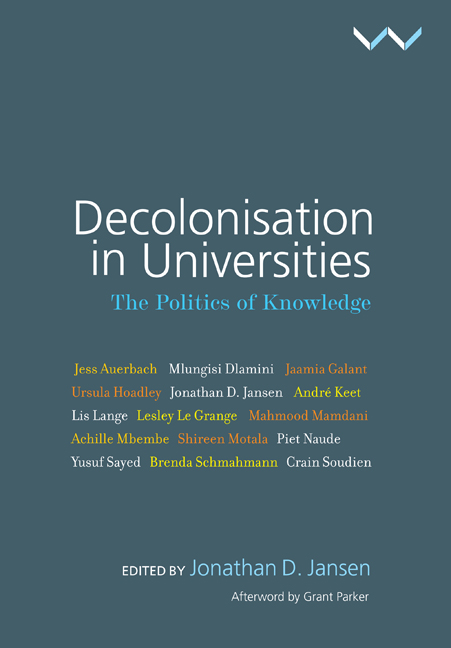Book contents
- Frontmatter
- Contents
- List of Figures
- Acronyms and Abbreviations
- Introduction and Overview: Making Sense of Decolonisation in Universities
- PART 1 THE ARGUMENTS FOR DECOLONISATION
- PART 2 THE POLITICS AND PROBLEMS OF DECOLONISATION
- PART 3 DOING DECOLONISATION
- PART 4 REIMAGING COLONIAL INHERITANCES
- Afterword: Decolonising Minds via Curricula?
- Contributors
- Index
Afterword: Decolonising Minds via Curricula?
Published online by Cambridge University Press: 25 October 2019
- Frontmatter
- Contents
- List of Figures
- Acronyms and Abbreviations
- Introduction and Overview: Making Sense of Decolonisation in Universities
- PART 1 THE ARGUMENTS FOR DECOLONISATION
- PART 2 THE POLITICS AND PROBLEMS OF DECOLONISATION
- PART 3 DOING DECOLONISATION
- PART 4 REIMAGING COLONIAL INHERITANCES
- Afterword: Decolonising Minds via Curricula?
- Contributors
- Index
Summary
It may be useful to tease out some common threads that emerge from the foregoing chapters. In doing so it is impossible to avoid addressing the merits of the decolonisation movement itself, though that is not the intention. Rather, the emphasis will be on identifying some centres of gravity within the preceding discussions.
In the interests of full disclosure, I should first offer a word about my subject position. I offer these comments as an outsider to the field, yet no stranger to South Africa or to the broader issues at stake. A South African by birth and training, I was trained academically in ancient Greek and Roman studies. In keeping with recent trends, I have pursued ancient studies in a context of the comparative global humanities. In fact the frequent resistance of my field to engaging with (South) Africa has provided an incentive and an urgent need to explore connections and contexts, including colonial histories, anew. For this reason, while a classicist may seem uniquely unsuited to comment on the topic of decolonisation, I would argue that such a background encourages a broad and deep view of some of the issues at stake.
TIME FRAMES
First, a broader issue to emerge in the discussion around decolonisation is that of time frames. An oft-noted assumption of the Fallist protests was that university curricula are unreconstructed creations of colonialism: the existing reality is more complicated, as contributors here point out (see Sayed, Motala and De Kock, Chapter 8, and Jansen [2017]). This makes the ‘Why now?’ question disconcerting in several respects, in both a national and an international framework.
To be sure, the initial use of the term ‘decolonisation’ had a strictly political valence, denoting the process by which former colonies gained self-determination from mostly West European metropoles, most specifically in the period from 1947 (Partition) to 1962 (Algeria's independence from France), though those dates by no means encapsulate the entire process.
In South Africa, by contrast, the call for decolonisation comes very belatedly in relation to twentieth-century world history, and even then somewhat belatedly compared to the establishment of democracy in the country.
- Type
- Chapter
- Information
- Decolonisation in UniversitiesThe Politics of Knowledge, pp. 255 - 264Publisher: Wits University PressPrint publication year: 2019

